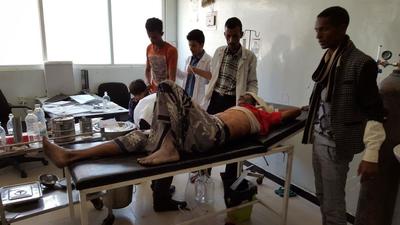The recent conflict between Islamic State (IS) fighters and Kurdish forces in the north of Iraq has led to the displacement of over 250,000 people since 3rd August, many of whom have fled to Iraqi Kurdistan.
Medecins Sans Frontieres/Doctors Without Borders (MSF) was the first medical aid organisation to arrive at the desolate Bharka camp last week. More than 2,500 people, mainly Sunni and Shia Iraqis from Mosul, have now settled at the camp in Erbil governate. After an exhausting journey, most families initially found shelter from the scorching sun in an abandoned hangar, some 10km outside of Erbil.
On 12th August, an MSF mobile clinic was at the camp providing primary healthcare services while tents and infrastructure were still being set up. Since then, a team of two doctors and a nurse has carried out over 400 consultations. MSF has also set up a rehydration point at the camp. With temperatures soaring and gusts of wind lifting dust across the camp, water and shade are crucial for survival.
Now that other humanitarian organisations and United Nations agencies have arrived at the camp, MSF is planning to hand over the clinic, redeploying its team to places where people are even more in need of emergency assistance.
In this interview, MSF’s Project Coordinator in Erbil, Will Harper, describes the situation on the ground, MSF’s response and the challenges ahead.
How many people have been displaced in the area since August 3rd?
This has been a massive and very fast displacement of people, even compared to the displacement after Mosul fell in June. Some people literally left with just the clothes on their backs. Many of these people entering Erbil had already been displaced two, three or four times. With each displacement there are concerns and risks, leaving people more vulnerable and in greater need.
Both the communities and authorities are doing what they can and prioritising what they feel is most important. You have to remember that Iraqi Kurdistan is already hosting over 230,000 Syrian refugees, putting a strain on budgets and resources. With the recent influx of even more people, resources have been stretched even further, creating more gaps – this is where MSF is trying to help.
How is MSF responding?
MSF had been providing medical care to people in the disputed areas between Erbil and Mosul, but in recent weeks people fled those areas in anticipation of attacks. That team has now moved and is providing care to people in Bharka camp, the largest camp for internally displaced people (IDPs) being constructed by the authorities in Erbil.
MSF has been providing daily healthcare in Bharka camp since August 12th. The team includes some doctors and nurses who have themselves been displaced , which helps to create a stronger connection with the community living in the camp.
What is the situation in Bharka camp?
The camp is a tough place for anyone to live, especially for people who have arrived with nothing after being displaced a number of times. There are currently over 2,500 people at the camp, and expansion plans are already underway. Temperatures are in the mid-40s every day. There are serious concerns about the water and sanitation conditions, but now that other organisations have started to work at the camp the situation should improve.
What kind of assistance do people need?
Patients being treated at our clinic recount stories of leaving everything and walking across the border to Erbil. When you consider that, the priorities are obvious – people need everything; clean water and sanitation, as well as food, shelter and healthcare. It’s not only people in the camp who need assistance, but others living in other shelters or being hosted by the local community.
What are the main challenges to providing assistance?
For us, the challenge is to balance what is possible and what is needed – for every location where we are working to provide good quality healthcare, there may be another group of people arriving or moving that we need to track and assist. With so many displaced people the challenge is to target our work to the most vulnerable.
How is MSF balancing its work for Syrian refugees and for the displaced Iraqi people?
The short answer is that everyone is working harder and working longer. Our Syrian staff working in the Syrian refugee camps have done an amazing job to maintain our standards in the camps while we move some of our team into new areas. It is critical that organisations and donors do not forget the 230,000 Syrian refugees in Iraqi Kurdistan. Their situation remains the same even with the new international focus on Iraqi Kurdistan.
What is the next step for MSF?
MSF is striving to provide medical care to the Iraqi people, and to Syrian refugees in Iraq, throughout the ongoing conflict. MSF has worked in Iraq since 2006, and has more than 300 staff working in the country.





